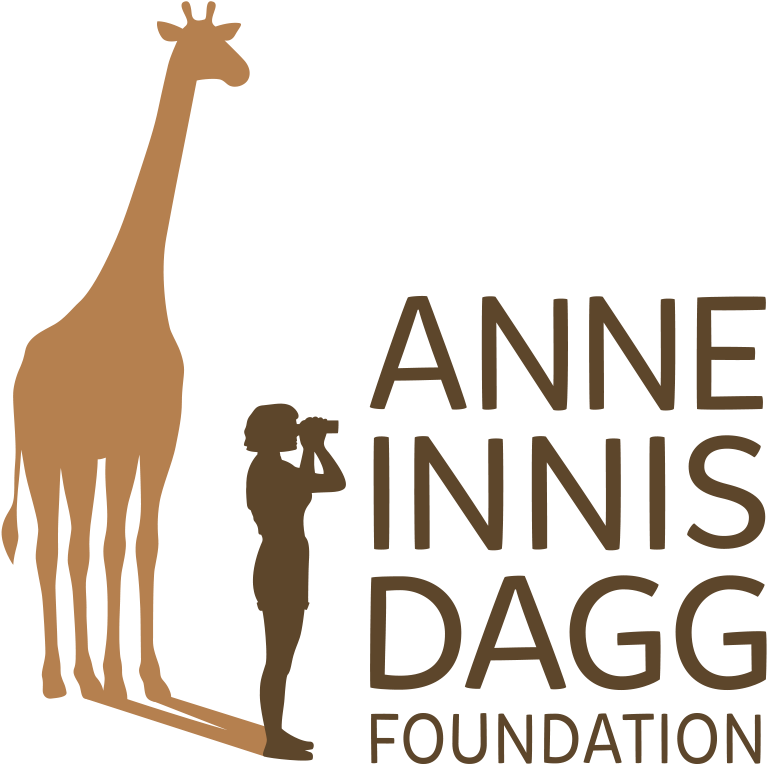Established in 2020, the Anne Innis Dagg Foundation provides support to organizations and individuals that protect the survival of one of the most magnificent creatures on the planet, the giraffe.
Over the last 30 years, the giraffe population in Africa has reduced by up to 40%, with some sub-species being listed as critically endangered. According to the IUCN Red List, the giraffe adult population was listed at just under 70,000 in 2016. Protecting giraffes has required a multi-faceted approach due to the many threats that they face: habitat destruction, poaching, wildfires, drought, and illegal trafficking of trophies.
We have a three pillar approach to our conservation efforts with ongoing support as follows:
Education - We are the premiere, trusted source for giraffe facts. We hold monthly online meetings for our Junior Giraffe Club featuring giraffe and conservation guests from around the world. The Foundation funds three indigenous educators who connect with over fifteen rural schools and present learning materials about giraffes and habitat conservation in Tanzania. Set to open in late 2025, The Anne Dagg Education Research Center is a place for post secondary students to further their research in the field. It is part of Wild Tomorrow’s Conservation Headquarters based in KwaZulu-Natal, South Africa.
Nourishment - We work together with our partners to teach school-age children how to plant trees for giraffes and provide a food source for themselves and their families. Community Engagement is a vital link for understanding the needs of the people who live amongst the giraffe.
Prevention - We fund patrols in high risk poaching areas including support for poacher and sniffer dogs. Technology plays a big part in today’s conservation efforts and we provide funding to a conservancy group that monitors their property and shares multipurpose information.
For more details, please see our “What We Do” section.
All operational costs and management fees associated with the Anne Innis Dagg Foundation are covered by a private fund. We want our donors to know that 100% of your donations go directly to fund these initiatives.
OUR PARTNERS OUR WORK
Anne’s trip to Kenya in January 2020 allowed her to visit some of her favourite locations to spot giraffe. She was reminded of the challenges they face and returned with a set of directives for her foundation. We needed to partner with like-minded conservationists who are doing work in the field. The Anne Innis Dagg Fund was established within Wild Nature Institute and African Wildlife Foundation to section off projects specific to Anne’s objectives.
Wild Nature Institute scientists led by Monica Bond, PhD and Derek Lee, PhD, conduct original field research, analyze existing available data, and synthesize primary scientific literature to inform education and actions that protect wild nature. They are doing a tremendous amount of work, both in terms of science and education. WNI is actively collecting data and doing research on over 4,000 giraffes in Tanzania.
Anne Dagg was a fellow member of the Giraffe and Okapi Specialist Group with Derek Lee of the Wild Nature Institute, who is based in Tanzania. They spoke about the power of education and how it can establish a future for conservation. The AID Foundation funded the first Anne Innis Dagg Education Coordinator for Wild Nature Institute.
African Wildlife Foundation (AWF) is a large organization with activities in many African countries. For our purposes, Anne narrowed the scope to concentrate on “giraffe-focused” efforts close to the work being done with WNI in Tanzania. AWF has ongoing giraffe conservation work on the Kenya side of the cross-border landscape but have not yet secured funds to implement planned activities on the Tanzania side.
Any funds raised on behalf of the Anne Innis Dagg Foundation will allow AWF and its partners to implement critically needed giraffe conservation activities in Mkomazi National Park and the surrounding area. AWF will ensure the transboundary giraffe conservation work is coordinated for the benefit of the species and people.
Wild Tomorrow is working to protect, restore and re-wild a critically important wildlife corridor in KwaZulu-Natal, South Africa. To date they have secured over 4,000 acres of land - much of which was at risk from development.
This land, together with three conservation-minded neighbors, is now officially recognized as a protected area under South Africa’s Protected Areas Act. This means that the Greater Ukuwela Nature Reserve can never be mined, farmed or developed.
APOPO is a global non-profit organization that trains rats and other scent detection animals to protect people and the planet with effective detection solutions. They are best known for their landmine detection HeroRATs, but also work in other applications, including the detection of illegally trafficked wildlife products. The wildlife trafficking detection program uses giant pouched rats, HeroRATs, to scent-detect rhino horn, elephant ivory, pangolin scale, African blackwood, and most recently, giraffe.
Together, we’re breaking new ground: training rats to sniff out trafficked giraffe parts at ports in East Africa. These amazing animals will work alongside human trainers in a team effort to combat wildlife trafficking. Stopping the illegal trade in giraffe parts is key to protecting this iconic and threatened species. This collaboration is a unique and hopeful step forward in the fight against poaching.
“My life long passion has been, and continues to be, to help giraffes to survive and thrive in the wild.”
- Dr. Anne Innis Dagg
Distribution range of giraffe subspecies. Figure 1A & 1B. Petzold A, Magnant A-S, Edderai D, Chardonnet B, Rigoulet J, Saint-Jalme M & Hassanin A (2020). First insights into past biodiversity of giraffes based on mitochondrial sequences from museum specimens.
European Journal of Taxonomy, Page 3.







